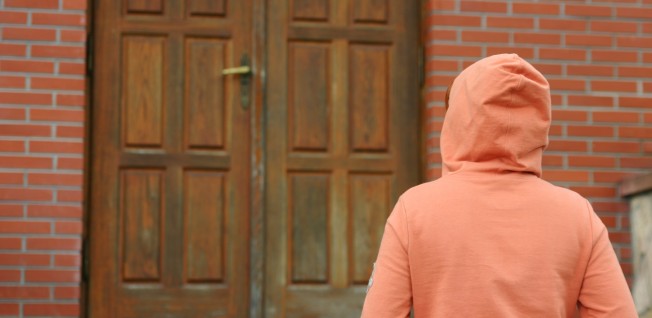When Going Back Home Drives Us Crazy

The Christmas break is approaching and we start planning our visit back home. We are buying gifts; we are feeling increasingly excited and possibly a little bit nervous. We all come back now and again. For whichever reason we left home and however long ago, it happens to us to go back for family gatherings or just for a weekend.
Do you remember sitting at a family meal and suddenly feeling eight years old? For a child, not wanting to eat your salad can raise an internal conflict between wanting to please the adults and being a “good boy/girl” and, at the same time, genuinely hating the salad. Not for an adult though. But, staring at our plate prepared by our mother, we feel exactly as if we were eight years old.
The parent’s home offers plenty of powerful triggers. The old feelings come back in a strange bunch of ghosts, feeding our nightmares. We sleep in our old room filled with well-known items, and bump into old acquaintances or family friends. Sometimes being back to our parent’s makes us feel exactly as it “should”: warm, protected, loved. But what if it doesn’t, and instead this old scenery makes us feel sad, angry or even depressed?
A Visit to the Past
We start wondering how exactly our childhood experience was. Very often we feel some dissonance between how our parents pretend it was and the version our own emotional memory suggests. We feel confused, we feel guilty for having these thoughts, and also angry and frustrated with our parents for not being able to understand, to relate to our experience. Again, an adult can eventually deal with this kind of anxiety-producing situation. But for a child it is overwhelming, and at that point we are just eight years old and powerless in front of the adults who are in charge. This regression does not help dealing with the whole family setup, eventually sending us back to the darkest places of our childhood.
At times, we all need is some form of validation for the version of reality we have experienced. We just need somebody acknowledging that it was just as we remembered it, and we are entitled to have these not-always-positive feelings about it. We are not going crazy or making things up. If we have siblings and if we are lucky enough to have a good enough relationship, we can compare our experiences. Often, it helps, and, together, it becomes easier to figure out how it was and how it made us feel.
We grew up in this place surrounded by these people. The experience of being there and being attached to them shaped our personalities. Sometimes acknowledging their powerful influence on our life feels already painful enough.
Often, for those who left home early and went away, there has been a good-enough reason for taking this decision. We all believe we were interested in exploring the world and wanted to see places. The itchy feet do exist, but very often we also had our own deep reasons to flee the place or the family we lived with. So, even if carefully hidden by ourselves and from ourselves, this emotional knowing is still present. Coming back home, even for a short stay, we find ourselves facing it all again.
It might be helpful to recognize that every family is a well-established system with its specific dynamic. Once distanced, we remain a part of its functioning. And the missing piece (remember your old puzzles?) tends to become the most figural and somehow important. Coming back, even for a short time, we tend quickly to fit in the same place we used to occupy or the role we used to play in the system.
Will our parents be able to accept our partner? Will he fit in this world? Will they be able to relate better to our children than they did to us? Will they validate our recent decision to, for example, divorce or to change career? Their potential expectation and judgement flows in the air, and we cannot avoid feeling somehow contaminated by it.
Growing with the Experience
Very often, my clients report eating too much whilst spending holidays at their family home. Even for those who are not prone to binge eating, it becomes difficult to avoid the kitchen. Filling ourselves with homemade food (the Bridget Jones’ turkey curry!), even truly delicious, can be a way of avoiding some deep emotional truth we are not ready to meet. So, we come back to our lives swollen, unhappy and emotionally exhausted.
It can be a painful experience to look back, especially when we learnt so well to set fire to bridges and to keep moving on, or just to move around. Even if it takes a lot of courage to make a sense of this past experience, it is an important step for growth. The family home will not be there forever and our parents will also not be eternally around, so let’s make the most of this occasion to better understand ourselves. Re-writing the childhood chapters of our life story can be a proving but an exciting experience!
Some useful tips to bring back home:
- Listen to yourself. Acknowledging the existence of our particular emotional response to being at home is already a good step forward.
- Share with friends or siblings how you are feeling. Look for validation of your experience.
- Try to not respond to parents from your eight-years old, but rather from the adult you have become in the meantime.
- Once back, reflect on the experience and make sense of your emotional responses to the family visit.
Anastasia Piatakhina Giré is an integrative psychotherapist practicing in Madrid, and also worldwide through Skype.










